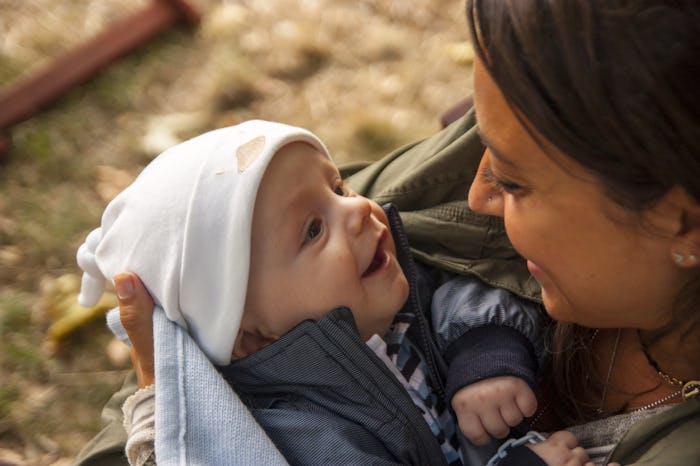Life

The Pros & Cons Of Baby Talk
When you're overcome with the cuteness of your child, it's difficult to refrain from slipping into baby talk. After all, those tiny "widdle" toes are beyond adorable, making it hard not to use a sing-song voice when addressing your kiddo. But then you may second-guess the effects of this language on your child's development. So is baby talk good for babies, or should you speak more formally around your little one? As with many parenting topics, there are pros and cons to both approaches.
For starters, there is some evidence that baby talk may help your child's language development skills. According to a 2014 study in Developmental Science, children exposed to the greatest amount of baby talk at 1 year of age had a larger vocabulary than their counterparts by their second birthday. Admittedly, the study only followed 26 children, so it may be the case that more research is needed to conclusively say baby talk is great for children's speech development. But these findings suggest baby talk just might help your child understand language at a younger age.
Of course, not everyone is on board the baby talk train. According to Psychology Today, using simplified language may inhibit a child's language development. Generally, kids exposed to complex sentences may have greater language comprehension, as further noted by Psychology Today. (Note: the referenced study was on preschool-aged children, so it's difficult to say whether these findings would apply to infants). Suffice it to say, plenty of experts and parents alike are not fans of baby talk, and prefer speaking to kids in a more conversational way.
There may even be a middle ground between baby talk and adult conversation: Parentese. According to PBS, Parentese encourages caregivers to speak in a sing-song voice with elongated vowels. You're basically slowing down or exaggerating normal speech so the baby can understand how to mimic the sounds. You do not, however, use nonsense sounds or noises. Parentese is kind of the linguistic equivalent of training wheels: something that provides your kid with an easy way to learn before she's ready to take off on her own.
As with many parenting topics, the question of whether baby talk benefits babies is deceptively simple. You could easily accumulate several books' worth of studies and professional opinions from linguistics and parenting experts on this topic, and still not reach a final conclusion. With that in mind, whether you choose to use baby talk with your own little one is up to you.